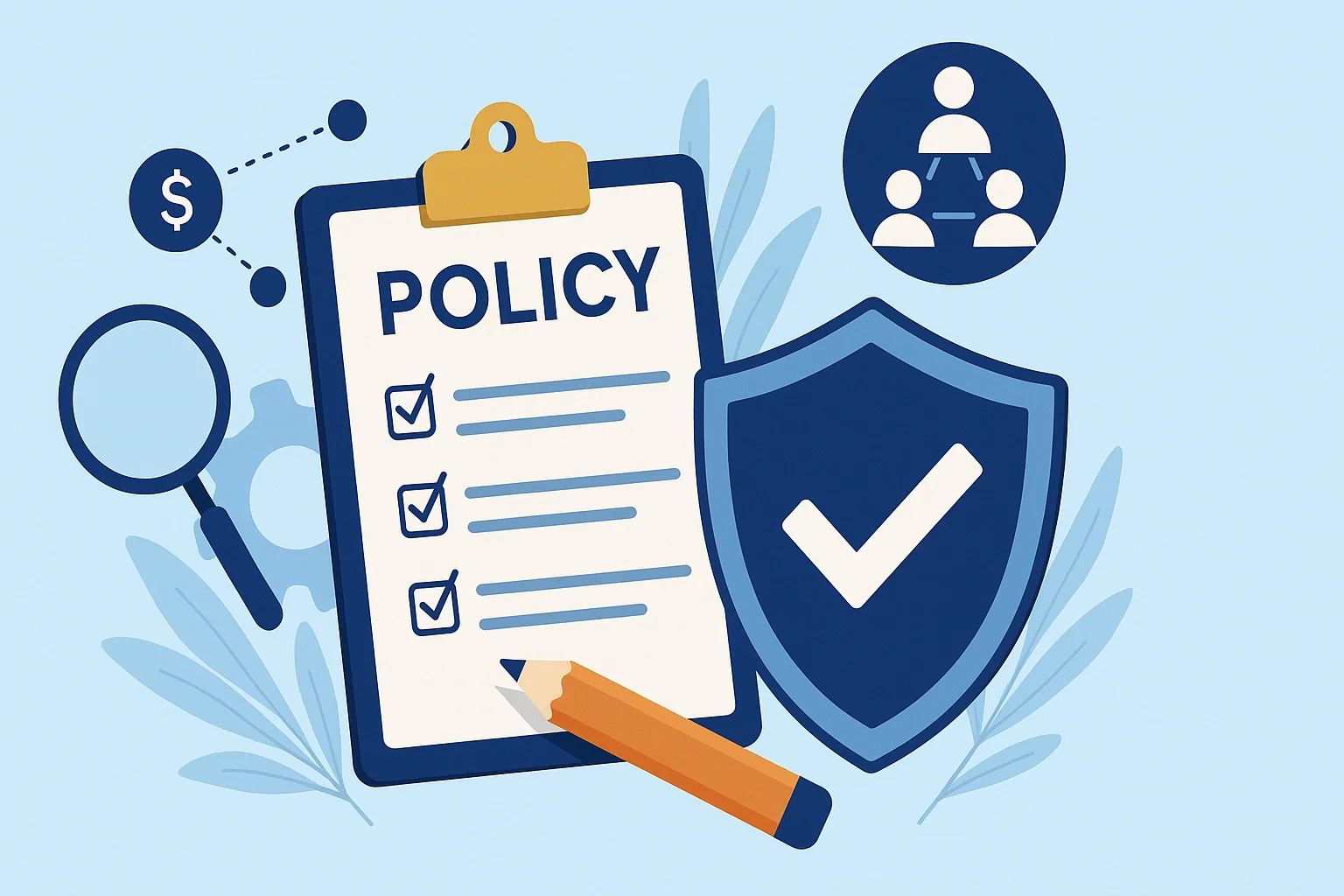Affiliate marketing has evolved into a cornerstone of modern digital business strategies, generating billions in revenue annually while creating complex webs of partnership relationships. However, with this growth comes increased scrutiny from regulators, heightened consumer awareness, and the critical need for robust affiliate policy frameworks that protect all stakeholders involved.
Organizations operating affiliate programs face mounting pressure to maintain compliance across multiple jurisdictions while managing diverse partner relationships. From healthcare entities navigating HIPAA requirements to e-commerce platforms ensuring FTC compliance, the stakes have never been higher. A single policy violation can result in substantial fines, damaged brand reputation, and severed partnership agreements.
This comprehensive guide addresses the essential components of effective affiliate policy development, providing compliance officers, legal professionals, and marketing managers with the frameworks needed to build sustainable, compliant affiliate relationships. Whether you’re establishing your first affiliate program or updating existing policies to meet evolving regulatory standards, understanding these fundamental principles will safeguard your organization’s interests while fostering productive partnerships.
The complexity of affiliate policy management extends beyond simple terms and conditions. Modern affiliate policies must address data protection regulations like GDPR and CCPA, integrate seamlessly with privacy frameworks, and provide clear enforcement mechanisms that protect brand integrity without stifling partner innovation.
Understanding Affiliate Relationships in Modern Business

An affiliate relationship exists when one entity promotes another’s products or services in exchange for compensation, typically commission-based. These partnerships can range from simple referral arrangements to complex healthcare affiliations requiring extensive regulatory oversight.
The regents policy on affiliation with health care entities, for example, establishes strict guidelines for academic institutions partnering with medical organizations. Similarly, UC Davis health policy on affiliating with health care entities requires comprehensive due diligence processes and ongoing compliance monitoring to ensure patient safety and regulatory adherence.
Traditional Marketing Affiliates operate through performance-based partnerships where compensation depends on specific actions like sales, leads, or clicks. These affiliates typically maintain independent websites or social media channels to promote partner products.
Healthcare Entity Affiliations represent more complex relationships involving shared resources, patient care responsibilities, and regulatory compliance obligations. The UCOP policy affiliation with health entities requires extensive documentation, regular audits, and clear governance structures to manage these sensitive partnerships.
Strategic Business Affiliates encompass joint ventures, licensing agreements, and collaborative partnerships that extend beyond simple marketing arrangements. These relationships often involve shared branding, co-developed products, or integrated service offerings.
Understanding these distinctions is crucial for developing appropriate policy frameworks. Each affiliate type requires specific compliance measures, monitoring protocols, and enforcement mechanisms tailored to their unique risk profiles and operational characteristics.
Core Purpose and Scope of Affiliate Policies

Effective affiliate policies serve multiple critical functions within organizational governance structures. Primary purposes include ensuring legal compliance across all jurisdictions where affiliates operate, protecting brand reputation through consistent messaging and ethical practices, and establishing clear expectations for partner behavior and performance standards.
Legal compliance represents the most fundamental purpose of comprehensive affiliate policy frameworks. Organizations must navigate complex regulatory environments including consumer protection laws, data privacy regulations, advertising standards, and industry-specific requirements. Healthcare affiliations, for instance, must comply with HIPAA privacy rules, Stark Law provisions, and state-specific medical practice regulations.
Brand protection requires establishing clear guidelines for affiliate marketing activities, content creation standards, and customer interaction protocols. Affiliates serve as extensions of your brand, making their compliance with established standards essential for maintaining customer trust and market reputation.
The scope of modern affiliate policies extends far beyond traditional marketing partnerships. Contemporary frameworks must address data handling practices, cross-border compliance requirements, intellectual property usage, and crisis management protocols. This comprehensive approach ensures consistent policy application across diverse affiliate relationships and geographic markets.
Ethical Considerations form the foundation of sustainable affiliate relationships. Policies must establish clear standards for honest advertising, transparent disclosure requirements, and fair competitive practices that protect consumers while enabling legitimate business growth.
Operational Standards define specific performance expectations, reporting requirements, and communication protocols that enable effective program management. These standards ensure affiliates understand their responsibilities while providing organizations with necessary oversight capabilities.
Essential Compliance Requirements for Affiliate Programs
Affiliate policy compliance encompasses multiple regulatory frameworks requiring careful coordination and ongoing monitoring. Data protection regulations like GDPR and CCPA impose strict requirements on how affiliate programs collect, process, and store personal information.
GDPR Compliance mandates that affiliate policies clearly define data processing roles, establish lawful bases for data collection, and provide transparent privacy notices to end users. Affiliates operating in European markets must implement appropriate technical and organizational measures to protect personal data throughout the customer journey.
CCPA Requirements focus on consumer privacy rights including data access, deletion, and opt-out provisions. Affiliate policies must establish clear procedures for handling consumer requests while ensuring compliance across all program participants.
Advertising Standards vary significantly across jurisdictions but generally require truthful, non-deceptive marketing practices with clear affiliate relationship disclosures. The FTC’s Endorsement Guides mandate “clear and conspicuous” disclosure of material connections between affiliates and merchants.
Privacy policy for affiliate websites must integrate seamlessly with primary organizational privacy frameworks while addressing affiliate-specific data collection and usage practices. These policies should clearly explain how affiliate tracking works, what data is collected, and how consumers can exercise their privacy rights.
Industry-Specific Regulations add additional complexity layers. Healthcare affiliates must comply with HIPAA requirements, financial services affiliates face SEC and FINRA oversight, and educational institution affiliates must adhere to FERPA provisions.
Compliance monitoring requires systematic approaches including regular policy reviews, affiliate training programs, and automated monitoring systems that can identify potential violations before they escalate into regulatory issues.
Effective Affiliate Policy Monitoring and Enforcement

Successful affiliate policy monitoring requires multi-layered approaches combining automated systems, regular audits, and clear violation response protocols. Organizations must balance partner autonomy with necessary oversight to maintain compliance without stifling affiliate performance.
Automated Monitoring Systems can track affiliate marketing activities, identify potential policy violations, and generate compliance reports for management review. These systems typically monitor advertising content, website practices, and customer interaction patterns to identify concerning trends or specific violations.
Regular Audit Processes provide deeper compliance assessments including detailed reviews of affiliate websites, marketing materials, and data handling practices. Audit schedules should reflect affiliate risk profiles with higher-risk partners receiving more frequent reviews.
Performance Monitoring tracks affiliate compliance metrics alongside traditional performance indicators. This approach helps identify correlations between compliance lapses and performance issues while rewarding affiliates who maintain high standards.
Enforcement mechanisms must provide graduated response options ranging from informal guidance to partnership termination. Clear escalation protocols ensure consistent policy application while preserving valuable partner relationships whenever possible.
Warning Systems allow organizations to address minor violations through educational approaches before implementing punitive measures. This collaborative approach often resolves compliance issues while strengthening partner relationships.
Suspension Protocols provide intermediate enforcement options for more serious violations requiring immediate corrective action. Temporary suspensions can protect organizational interests while allowing affiliates opportunities to address compliance gaps.
Termination Procedures represent final enforcement measures for affiliates who demonstrate persistent non-compliance or commit serious policy violations. Clear termination criteria and procedures protect organizations from legal challenges while maintaining program integrity.
Comprehensive Affiliate Program Terms and Conditions
Effective affiliate program terms establish clear frameworks for partner relationships including compensation structures, performance expectations, and mutual obligations. These terms must balance organizational protection with affiliate attractiveness to maintain competitive program positioning.
Compensation Structures should clearly define commission rates, payment schedules, and performance bonuses while establishing minimum performance thresholds and quality standards. Transparent compensation policies reduce disputes and encourage affiliate investment in program success.
Affiliate Responsibilities must encompass compliance obligations, performance standards, and reporting requirements. Clear responsibility definitions prevent misunderstandings while providing enforcement foundations for policy violations.
Intellectual Property Provisions protect organizational assets while defining acceptable usage parameters for affiliates. These provisions should cover trademark usage, content licensing, and brand representation standards.
Termination Clauses establish conditions under which either party may end the affiliate relationship along with post-termination obligations like commission payments and data deletion requirements. Well-crafted termination provisions protect both parties while enabling clean relationship endings when necessary.
Limitation of Liability clauses protect organizations from affiliate actions while establishing reasonable responsibility boundaries. These provisions must comply with applicable consumer protection laws while providing necessary organizational protections.
Dispute Resolution mechanisms provide structured approaches for addressing conflicts between organizations and affiliates. Alternative dispute resolution options can reduce costs and preserve relationships while ensuring fair conflict resolution.
Privacy Policy Integration for Affiliate Marketing
Privacy policy integration represents a critical component of compliant affiliate program management. Effective integration ensures consistent privacy protection across all customer touchpoints while meeting regulatory requirements in multiple jurisdictions.
Data Flow Mapping identifies how personal information moves between organizations, affiliates, and third-party service providers. Clear data flow documentation enables proper privacy notice creation and regulatory compliance demonstration.
Joint Controller Arrangements may be necessary when organizations and affiliates share data processing responsibilities. These arrangements require detailed agreements defining each party’s compliance obligations and consumer communication responsibilities.
Privacy Notice Requirements mandate clear, conspicuous disclosure of affiliate tracking practices and data sharing arrangements. Privacy notices must explain what data is collected, how it’s used, and what rights consumers have regarding their information.
Affiliate marketing privacy policy development requires specialized expertise in both privacy law and affiliate marketing practices. These policies must address unique aspects of affiliate tracking while maintaining compliance with broader organizational privacy commitments.
Cookie Compliance requires proper consent mechanisms for affiliate tracking technologies along with clear explanations of how cookies enable affiliate attribution and commission payments.
Cross-Border Data Transfers in international affiliate programs must comply with applicable data transfer restrictions including GDPR adequacy requirements and standard contractual clauses.
Real-World Affiliate Policy Examples and Best Practices
Leading affiliate programs provide valuable insights into effective policy development and implementation strategies. These examples demonstrate how successful organizations balance compliance requirements with program growth objectives.
Amazon Associates Program exemplifies comprehensive affiliate policy development with clear guidelines for link usage, content requirements, and disclosure obligations. Their policy emphasizes transparency while providing affiliates with specific guidance on acceptable marketing practices. Amazon’s approach includes detailed examples of proper and improper affiliate practices along with regular policy updates reflecting regulatory changes.
Shopify Affiliate Program showcases effective compensation structure communication and compliance rule implementation. Their policy clearly defines affiliate responsibilities while providing attractive incentives for high-performing partners. Shopify’s framework includes specific guidelines for affiliate marketing policy development and implementation across diverse merchant categories.
eBay Partner Network demonstrates sophisticated affiliate policy monitoring and enforcement capabilities. Their systematic approach combines automated monitoring with human review processes to identify policy violations while maintaining partner relationships. eBay’s model provides valuable insights into scaling compliance operations across large affiliate networks.
ClickBank Affiliate Marketplace features comprehensive terms and conditions addressing the unique challenges of digital product affiliate marketing. Their policy framework addresses product quality standards, refund policies, and customer service requirements while enabling rapid marketplace growth.
Awin Affiliate Network illustrates effective privacy policy integration for affiliate websites with robust data protection measures meeting GDPR requirements. Their approach demonstrates how large-scale affiliate networks can maintain compliance across multiple jurisdictions while serving diverse merchant and affiliate populations.
CJ Affiliate (Commission Junction) exemplifies comprehensive affiliate marketing guidelines including detailed privacy standards and ethical considerations. Their policy framework addresses complex multi-channel attribution while maintaining transparency and consumer protection standards.
Strategic Best Practices for Affiliate Compliance Management
Successful affiliate compliance management requires strategic approaches that integrate policy development, training initiatives, and ongoing monitoring into cohesive organizational capabilities. Best practices from leading programs provide proven frameworks for achieving sustainable compliance while enabling program growth.
Comprehensive Training Programs ensure affiliates understand policy requirements and compliance obligations before beginning promotional activities. Effective training combines policy education with practical guidance on compliant marketing practices and violation avoidance strategies.
Regular Policy Updates keep affiliate policies current with evolving regulatory requirements and industry best practices. Systematic review processes should evaluate policy effectiveness while incorporating feedback from affiliates, legal counsel, and compliance monitoring activities.
Clear Communication Channels enable affiliates to seek guidance on compliance questions while providing organizations with early warning systems for potential issues. Responsive support systems can prevent many violations through proactive guidance and education.
Performance Integration combines compliance metrics with traditional performance measurements to reward affiliates who maintain high standards while achieving strong results. This approach encourages voluntary compliance while identifying partners who may need additional support or monitoring.
Technology Solutions can automate many compliance monitoring and enforcement activities while providing affiliates with real-time guidance on policy requirements. Investment in appropriate technology platforms enables scalable compliance management without proportional increases in administrative overhead.
Understanding how these best practices apply to specific organizational contexts requires careful consideration of program objectives, regulatory environments, and partner relationship dynamics. Successful implementation often involves phased approaches that gradually increase compliance sophistication as programs mature and expand.
Building Sustainable Affiliate Policy Frameworks
Effective affiliate policy development represents an ongoing organizational capability rather than a one-time compliance exercise. As regulatory environments evolve and business relationships become more complex, organizations must maintain adaptive policy frameworks that can respond to changing requirements while preserving program effectiveness.
The integration of affiliate policies with broader organizational governance structures ensures consistency across all partnership relationships while enabling specialized management of unique affiliate program requirements. This holistic approach protects organizational interests while supporting sustainable program growth and partner satisfaction.
Modern affiliate programs require sophisticated compliance management combining legal expertise, technology solutions, and strategic business development. Organizations that invest in comprehensive affiliate policy frameworks will be better positioned to capitalize on partnership opportunities while managing associated risks effectively.
By implementing the frameworks and best practices outlined in this guide, compliance officers and marketing managers can develop affiliate policies that meet current regulatory requirements while providing flexibility for future program evolution. Remember that effective affiliate policy management is an investment in long-term organizational success and sustainable partner relationships.
For organizations looking to optimize their broader marketing compliance efforts, exploring advanced marketing automation workflows can provide additional frameworks for maintaining consistent compliance across all marketing channels and partner relationships.
Frequently Asked Questions
What is an affiliate agreement?
An affiliate agreement is a legal contract between a company and an affiliate that outlines the terms and conditions for promoting the company’s products or services. It defines compensation structures, compliance requirements, and mutual obligations for both parties.
What is an example of an affiliate?
A common example is a blogger who reviews products and includes special tracking links that earn them commissions when readers make purchases through those links. Other examples include influencers, comparison websites, and email marketers who promote products for commissions.
What is the affiliate scheme?
An affiliate scheme (or affiliate program) is a marketing arrangement where businesses reward affiliates for bringing customers through their marketing efforts. The scheme typically involves tracking links, commission structures, and performance metrics to measure affiliate success.
What are affiliate terms?
Affiliate terms are the specific conditions and requirements that govern affiliate relationships, including commission rates, payment schedules, compliance obligations, termination clauses, and performance standards that affiliates must meet.
What is an affiliation agreement?
An affiliation agreement is a broader business arrangement between organizations that may involve shared resources, joint ventures, or strategic partnerships beyond simple marketing relationships. These agreements often require more extensive legal and regulatory compliance measures.
What is the rule for affiliates?
The primary rule for affiliates is transparency—they must clearly disclose their affiliate relationships to consumers. Additionally, affiliates must comply with advertising standards, data protection regulations, and any industry-specific requirements that apply to their promotional activities.
Is an affiliate an owner?
No, affiliates typically are not owners of the companies they promote. They are independent contractors or partners who earn commissions for successful referrals but do not have ownership stakes in the businesses they represent.
How do affiliates work?
Affiliates work by promoting products or services through various marketing channels using unique tracking links or codes. When consumers make purchases through these tracked referrals, affiliates earn predetermined commissions based on the agreed-upon compensation structure.
What are the three main types of affiliates?
The three main types are: 1) Content affiliates who create educational or review content, 2) Search affiliates who focus on paid advertising and SEO, and 3) Email affiliates who promote products through email marketing campaigns to their subscriber lists.


